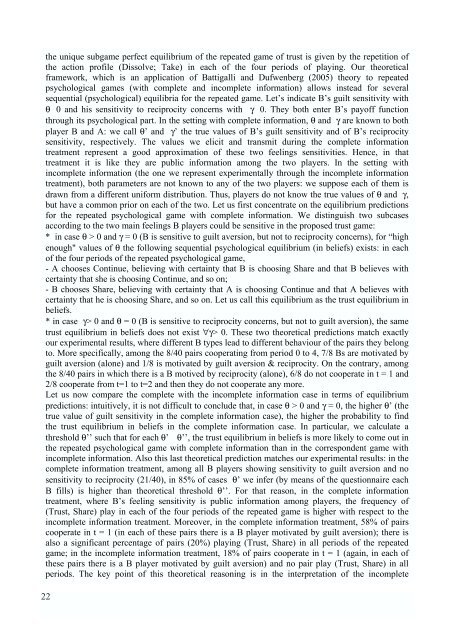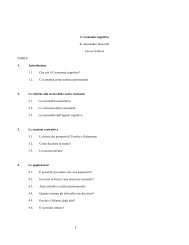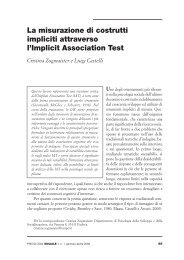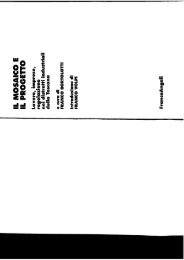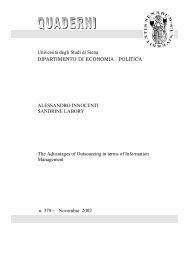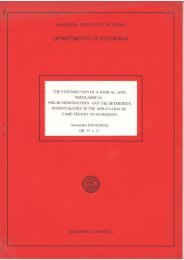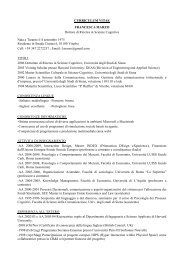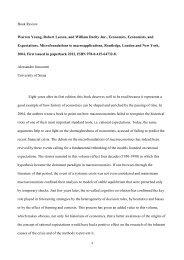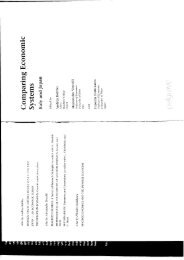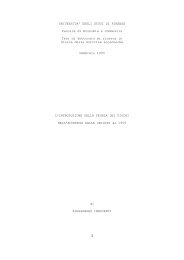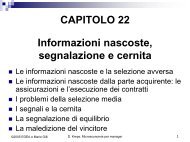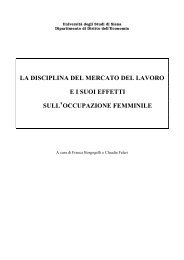Abstracts Book - LabSi
Abstracts Book - LabSi
Abstracts Book - LabSi
You also want an ePaper? Increase the reach of your titles
YUMPU automatically turns print PDFs into web optimized ePapers that Google loves.
the unique subgame perfect equilibrium of the repeated game of trust is given by the repetition of<br />
the action profile (Dissolve; Take) in each of the four periods of playing. Our theoretical<br />
framework, which is an application of Battigalli and Dufwenberg (2005) theory to repeated<br />
psychological games (with complete and incomplete information) allows instead for several<br />
sequential (psychological) equilibria for the repeated game. Let’s indicate B’s guilt sensitivity with<br />
θ 0 and his sensitivity to reciprocity concerns with γ 0. They both enter B’s payoff function<br />
through its psychological part. In the setting with complete information, θ and γ are known to both<br />
player B and A: we call θ’ and γ’ the true values of B’s guilt sensitivity and of B’s reciprocity<br />
sensitivity, respectively. The values we elicit and transmit during the complete information<br />
treatment represent a good approximation of these two feelings sensitivities. Hence, in that<br />
treatment it is like they are public information among the two players. In the setting with<br />
incomplete information (the one we represent experimentally through the incomplete information<br />
treatment), both parameters are not known to any of the two players: we suppose each of them is<br />
drawn from a different uniform distribution. Thus, players do not know the true values of θ and γ,<br />
but have a common prior on each of the two. Let us first concentrate on the equilibrium predictions<br />
for the repeated psychological game with complete information. We distinguish two subcases<br />
according to the two main feelings B players could be sensitive in the proposed trust game:<br />
* in case θ > 0 and γ = 0 (B is sensitive to guilt aversion, but not to reciprocity concerns), for “high<br />
enough" values of θ the following sequential psychological equilibrium (in beliefs) exists: in each<br />
of the four periods of the repeated psychological game,<br />
- A chooses Continue, believing with certainty that B is choosing Share and that B believes with<br />
certainty that she is choosing Continue, and so on;<br />
- B chooses Share, believing with certainty that A is choosing Continue and that A believes with<br />
certainty that he is choosing Share, and so on. Let us call this equilibrium as the trust equilibrium in<br />
beliefs.<br />
* in case γ> 0 and θ = 0 (B is sensitive to reciprocity concerns, but not to guilt aversion), the same<br />
trust equilibrium in beliefs does not exist ∀γ> 0. These two theoretical predictions match exactly<br />
our experimental results, where different B types lead to different behaviour of the pairs they belong<br />
to. More specifically, among the 8/40 pairs cooperating from period 0 to 4, 7/8 Bs are motivated by<br />
guilt aversion (alone) and 1/8 is motivated by guilt aversion & reciprocity. On the contrary, among<br />
the 8/40 pairs in which there is a B motived by reciprocity (alone), 6/8 do not cooperate in t = 1 and<br />
2/8 cooperate from t=1 to t=2 and then they do not cooperate any more.<br />
Let us now compare the complete with the incomplete information case in terms of equilibrium<br />
predictions: intuitively, it is not difficult to conclude that, in case θ > 0 and γ = 0, the higher θ’ (the<br />
true value of guilt sensitivity in the complete information case), the higher the probability to find<br />
the trust equilibrium in beliefs in the complete information case. In particular, we calculate a<br />
threshold θ’’ such that for each θ’ θ’’, the trust equilibrium in beliefs is more likely to come out in<br />
the repeated psychological game with complete information than in the correspondent game with<br />
incomplete information. Also this last theoretical prediction matches our experimental results: in the<br />
complete information treatment, among all B players showing sensitivity to guilt aversion and no<br />
sensitivity to reciprocity (21/40), in 85% of cases θ’ we infer (by means of the questionnaire each<br />
B fills) is higher than theoretical threshold θ’’. For that reason, in the complete information<br />
treatment, where B’s feeling sensitivity is public information among players, the frequency of<br />
(Trust, Share) play in each of the four periods of the repeated game is higher with respect to the<br />
incomplete information treatment. Moreover, in the complete information treatment, 58% of pairs<br />
cooperate in t = 1 (in each of these pairs there is a B player motivated by guilt aversion); there is<br />
also a significant percentage of pairs (20%) playing (Trust, Share) in all periods of the repeated<br />
game; in the incomplete information treatment, 18% of pairs cooperate in t = 1 (again, in each of<br />
these pairs there is a B player motivated by guilt aversion) and no pair play (Trust, Share) in all<br />
periods. The key point of this theoretical reasoning is in the interpretation of the incomplete<br />
22


